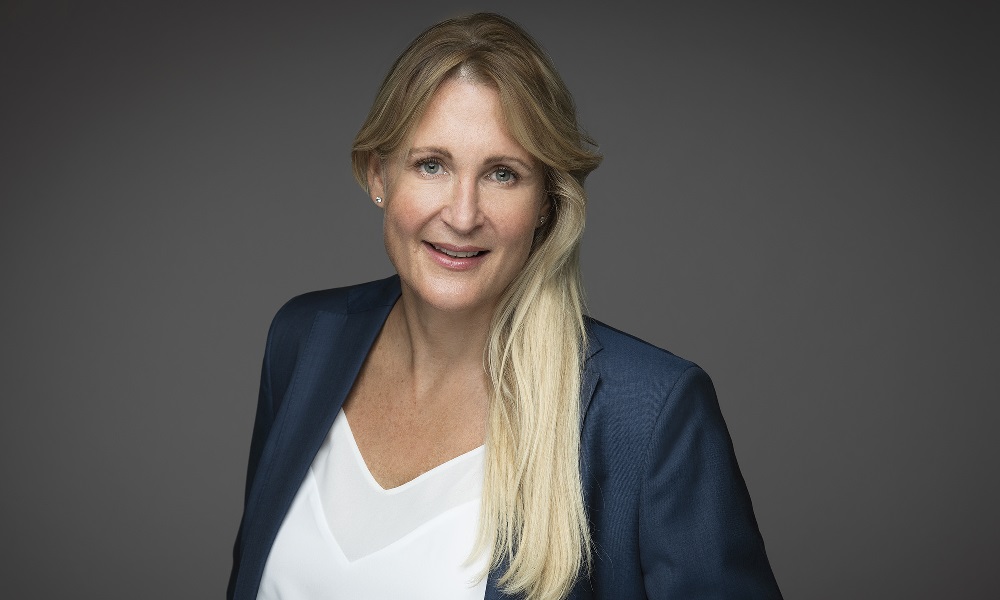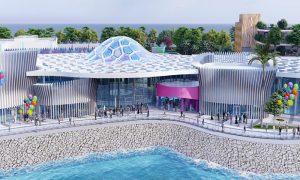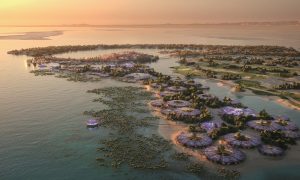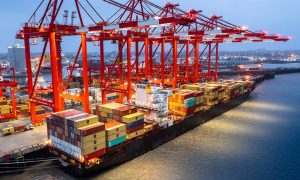Interview: Steering positive outcomes
Jason Saundalkar talks to WSP Middle East’s Kathleen McGrail about the firm’s advisory services business, market trends and challenges

WSP Middle East launched its advisory offering in early 2021 to offer infrastructure expertise and management consulting to clients, so that they could determine how best to develop assets and cost-effectively deliver services.
In recent years, developers, owners and operators of public and private infrastructure have faced a number of challenges due to a multitude of issues. It’s no wonder then that WSP’s business unit is already on strong footing.
“Our advisory services business fared very well in 2021 in parallel with WSP’s Middle East business, which evolved from strength to strength. Since launching our offering in early 2021, this business unit has experienced substantial growth, particularly across our environment & sustainability and development advisory service offerings. This expansion and success we believe is directly tied to our decision to align to core market trends and emerging areas of growth such as the desire to drive economic diversification away from oil and place a greater emphasis on sustainability,” said Kathleen McGrail, managing director – Advisory Services, WSP Middle East.
“KSA and the UAE are the two primary strategic markets that have dominated our bottom line this year and we anticipate this trend will continue well into 2022 and beyond. As 2022 gets underway, there are also positive signals that additional work in Qatar will materialise as our advisory services presence and expertise gathers pace in the region.”
Discussing the UAE and Saudi markets, McGrail notes that both markets offer challenges but confirms that they remain vibrant and attractive. “We are witnessing an exciting time in the Middle East as national transformation plans ramp up, particularly in KSA with the launch of highly ambitious and visionary projects. Now the focus is turning towards implementation and how stakeholders can ensure adequate project delivery in line with incredibly tight timeframes. As a consequence of extreme pressures on timelines, we have seen clients rushing into delivery without considering the necessary governance or auxiliary organisational structures that are required to support these considerable and complex infrastructure programmes. This can result of course in projects under-performing and clients ultimately not achieving their strategic objectives.”
She adds, “This is precisely where our development advisory practice comes to the fore, helping clients turn projects around and putting in place the desired implementation structures and governance that will achieve their desired project outcomes.”
Delving into client appetites following the outbreak of COVID-19, McGrail notes that there’s now a greater focus on managing environments and developing more sustainably. “One of the key focusses as a result of the pandemic is on providing safe, healthy and sustainable workplaces where employees feel proud to work for their organisations. We have also seen both the UAE and KSA come out with new net zero pledges, which is a major commitment from two of the key OPEC Middle Eastern nations to limit the impact of climate change and to address the environmental concerns raised by both the private and public spheres. We are starting to see this macro trend drive more activity in the private sector, with many companies now racing to begin the measurement and mitigation programmes required to limit their companies impacts and thus boost the sentiment and perception of their positive climate actions – both internally and externally.”
“Moreover, investors and the sovereign wealth community are also taking a keen interest in this space as capital becomes increasingly scarce in a post-pandemic world. Earlier this year, Mubadala Investment Company launched their responsible investing policy, which will enhance the focus of ESG (Environmental, Social, and Governance) issues in its portfolio and investment decisions. There are also signals that KSA’S Public Investment Fund will soon formally launch a programme to enhance ESG funded projects and outcomes.”
“We are currently assisting clients over this full spectrum of activities and programmes; from understanding the impact of the current and planned renewable energy projects, engaging in the set up and establishment of ESG practices through to HSE transformations and improved employee wellness programs. We are also assisting many of the large and medium corporates and government entities across the GCC to embed sustainability into their everyday ways of working,” she notes.
Asked about the business unit’s plans and objectives for 2022, she states, “Our primary objective is to become a trusted advisor to our clients and consequentially to continue to substantially grow our advisory services business across our four key service offerings; development advisory, digital advisory, PPP advisory and transformation advisory. All of these services are offered across all of our core market sectors including environment & sustainability, transport & infrastructure, power & water, property & buildings and energy.”
“We anticipate growth to come from both the private and public sectors, but the type of growth and services offered will be very market specific. The reason for this is that each GCC market currently sits at a different stage of the overall development cycle. As we move into 2022, the core focus for advisory services will continue to be on the KSA, Qatar and UAE markets.”
Asset Pain Points & Trend Influencers
Queried about what some of the biggest issues are with regards to existing infrastructure, masterplans and the causes behind these issues, McGrail responds, “The biggest issue is a lack of centralised planning and overall city integration. Often strategic plans are only done every five-to-ten years, which doesn’t match the speed of change and development in the region.”
“In addition, government agencies aren’t always aligned in terms of their roles, responsibilities and strategic objectives. This can be exacerbated if they don’t have the capacity to implement and enforce planning guidelines and optimise existing infrastructure assets. A greater application and use of centralised planning offices can assist with better integration of existing infrastructure assets with new projects, balance construction and delivery logistics and ultimately increase speed and effectiveness of project and programme delivery.”
In recent years several influences including government mandates, economic challenges and aspirations and emerging technologies have had an impact on existing and new infrastructure projects. Asked whether the existing dynamics will remain or if a change is in store, McGrail explains, “The world is recognising that meaningful action needs to be implemented to reduce emissions and adopt greener, more sustainable approaches to achieve a carbon-neutral world. At both a global and regional scale, green hydrogen is being touted as the new oil. Particularly in the UAE and KSA, the push towards hydrogen is a fundamental step in the right direction and the adage of green hydrogen makes this proposition even more compelling.”
She adds, “Clearly if regulations come into this space, the pace of implementation will be significantly heightened. This would in turn boost the pipeline of renewables schemes needed to power green hydrogen production and send a strong message to the rest of the world that traditionally petrochemical based economies are willing and able to pivot their energy mixes and lead brave initiatives that champion greener horizons.”
The Right Time for PPP?
It’s no secret GCC governments have significant ambitions for their countries including a desire to diversify their economies away from traditional income sources. Despite these ambitions and the mammoth scale of projects and thus a significant need for funding, public private partnerships (PPPs) aren’t as commonplace, and GCC markets are still seen to be somewhat green with regards to PPP.
Sharing her perspective about the market with regards to PPPs, McGrail says, “PPPs have been utilised in the GCC for a while now, however the market is still considered quite immature in this space versus other regions. Despite this, we believe that the GCC markets are poised for substantial growth in favour of pursuing PPPs. This is partially due to increasing pressures on government finances but also the desire for greater collaboration between the public and private sectors as emphasised in many of the regional visions. We are also seeing substantive PPP pipelines being built not only in KSA, but also in Qatar and the UAE, across a range of sectors such as education, healthcare, transport & infrastructure and power & water.
“However, to be more conducive to all parties, there needs to be a greater focus on mechanisms for risk transfer, management of the risk profile and ultimately more incentivised risk sharing. For example, the public sector can’t simply transfer all the risk without expecting the private sector to meet a reasonable desired level of return that they are achieving internationally. A renewed public sector focus on encouraging the adoption of PPPs and more incentivised risk profiles will certainly make the market more competitive and attract more international investment.”
Discussing the importance of digital transformation and data, and the impact they can have on infrastructure projects including boosting urban resilience, McGrail noted the benefits are immense.
“Digital transformation and the utilisation of better data management can significantly impact development delivery and ultimately drive cost savings across the development lifecycle. This can help drive operational excellence for multiple participants across the supply chain, including building more effective development ecosystems through the optimisation of designs via data and intelligence sharing across all parties and the use of modular and generative design.”
She continues, “Asset developers and operators are looking to have a single source of truth of their assets’ data by relying on standards such as BIM or buildings virtual replica or twins. This enables them to adopt a data-based understanding of their assets and infrastructure and hence lower the proportion of a costly reactive maintenance and extend their useful lifespan amongst other use cases.”
“Despite the broadness of the concept of urban resilience, technology is one of its core enablers. The examples are multiple; from the use of drones to monitor remote critical infrastructure to the utilisation of Internet of Things to monitor water pipelines and prevent leakages, or even relying on sensors to assess and monitor environmental conditions such as water quality, weather data or flooding risks in near real time – the use cases are vast,” she concludes.













